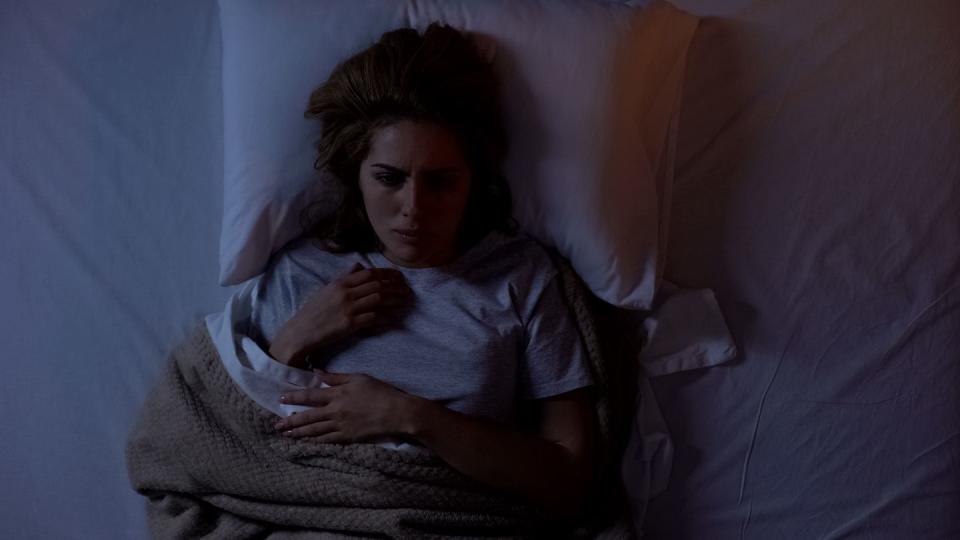‘My stress dreams are out of control. So, what do they mean?’

My housemate and I have a new ritual. Each morning, we stand at the bathroom sink, eyes at half mast, and, between brushing our teeth and rinsing our mouths out, discuss our dreams.
Had one of us tried to spark up the same conversation every single day even a month ago, we'd have been bored. After all, talking the fabric of your nocturnal adventures has a bit of a naval gaze-y reputation, the analysis broadly understood of as being deeply boring to the unfortunate person on the receiving end.
But then we each went through two weeks of horror. It was one of those times where bad stuff – things I'm not at liberty to share with the Internet – just kept on happening, everywhere, all around us.
That was when the weird dreams started. It began with my own visceral storyline of a miscarriage so bloody that I squirm when I think back to it now. I’m not pregnant, nor hoping to be, but it was so terrifying I shared every last detail with my housemate, when she asked me how I slept.
A morning or so after, she came to tell me of a dream in which the pair of us committed murder: another noteworthy vision to share as we squeezed stripy squares of Colgate onto our toothbrushes. And on and on it went, both of us waking up with cinematic stories to share in the bathroom.
Does stress cause weird dreams?
It turns out, my housemate and I aren’t alone in this development of strange and scary dreams during challenging times. People with generalised anxiety disorder have been found to be over three times as likely to report bad dreams as those without – 22% of anxiety suffers were having them at least once a week, compared to just 6% of non-anxious participants – according to study from the Behaviour & Sleep Medicine journal.
‘Stress can increase nightmare frequency, but not all dreams with stressful content are nightmares,’ says Dr Kat Lister, a sleep specialist and author of Sleep Sense. ‘The topic of these nightmares might not resemble what stresses you in waking life, but will typically reflect the emotional tone of the waking life experience.’
For instance, if you are feeling betrayed, you may dream about a betrayal, though it will likely be an altogether different – and less logical – experience of this emotion.
Why do we get stress dreams?
One reason why dreams can become more trippy or violent in times of stress is because the emotion causes the brain to spend longer in rapid eye movement (REM) sleep. This is the sleep stage in which dreams appear, so it stacks up that hard times mean more dreams, which then ups your chance of having a particularly weird one.
But that effect likely isn't an accident. Dreaming has a purpose, says Dale Mathers, a psychiatrist and author of Dreams: The Basics, so there is also a reason why we would spend longer doing it when we're overwhelmed.
‘Dreams are symbolic communications from our unconscious mind to our conscious mind,’ he says. ‘This is why we all wake very briefly after a dream - to upload it into consciousness, and then we fall asleep again.’
He says that there are three main reasons why we dream:
To make and consolidate memories: ‘We remember best when we are able to sleep after learning something new. In dreams we review old memories and then remake them, connecting to new information. We also "delete" memories we don’t need – especially important in resolving painful emotional experiences. If you have a severe trauma and you can’t dream about it, it never resolves.’
To learn empathy: ‘This is the most important function of dreams – and essential for normal emotional development. Dreams often contain strong feelings – anxieties, fears, dread. This allows our unconscious to work on them, so that we can integrate them, find new ‘dreamed’ solutions to emotional problems and develop our sense of self and who we are. This often happens in a paradoxical way – as a dream means both the things we see in it as well as the opposite of these. For instance, dreaming of a tiger might be scary, or suggest we need a tiger’s courage, or both.’
To creatively solve problems: ‘There are many examples of this – one is Paul McCartney’s great hit ‘Yesterday’, which came to him during sleep. Many scientific discoveries also happened because the person dreamed the answer. Writers use dreams to create plots – Malorie Blackman dreamed the end of ‘noughts and crosses’ and was upset because it wasn’t the ending she’d imagined.’
Bearing these factors in mind, it makes sense that we would dream intensely during periods of stress, trauma or anxiety.
‘Stressful waking experiences – or rather the memory that is created in the brain from these experiences – may be ‘tagged’ in some way with neurotransmitters such as cortisol. This could serve to highlight that these memories need further processing via dreams at night, giving the brain more to do in sleep,’ agrees Dr Lister.

But perhaps the best question isn’t what does stress do to our dreams, but what do our dreams do to stress? According to a study from 2022, students who reported a high frequency of nightmares had better stress management in their waking life. Meanwhile, another paper found a 34% reduction in dream recall in people who were depressed.
‘Dreams process events, they link it to memories of how we managed this stress last time, they connect the feeling about the stress to all the times we felt stress before,' says Mathers. 'Soldiers with post-traumatic stress disorder often can’t dream about what they’ve seen at all. This is a disaster – and once they learn to dream, they can begin to process their survivor’s guilt and trauma.’
How to deal with stress dreams
Waking up from stress dreams can feel scary, and some research suggests that although nightmares might be useful, they can cause higher levels of anxiety if they are unexpected or not understood.
If you are distressed by some of the images you see in your dreams, ‘give yourself compassion,’ Dr Lister says. You may feel triggered or tired, especially as stress impacts your sleep in ways beyond your dreams such as ‘keeping you in the lighter stages of sleep as the brain continues to think – so take time to calm yourself in the morning.
Try not to Google your dreams, either: ‘No one else can interpret a dream for you. There are no key symbols and every dream is unique to the dreamer at the moment they dream it. If I dream about a dragon on Monday it does not mean the same thing as if I dream about it on Tuesday – and the meanings always change and evolve over time,’ says Mathers.
Dr Lister also recommends managing stress in your daily life which isn't always easy, so instead try to balance moments of chaos or sadness with calm or joy. ‘The continuity between waking and sleep means how you spend your waking time will impact your dreams. As such, having more fun or relaxing moments in the day will also be picked up in your dreams,’ she says.
But most importantly, start to think of these weird, worrying or wacky dreams as a good thing, says Mathers. ‘It is the mind's natural way of processing events. Not having stress dreams would be a bigger problem, so encourage them,’ he explains.
Some people find that writing down their dreams may help them pinpoint what emotions they are processing in their sleep, and Mathers recommends asking yourself what your dreams may be telling you about what you feel and need.
While I am willing for a less adventurous and scary night, it's quite comforting to know that these dreams are my brains way of working through my distress. It's also valuable for me to think about how well my body and mind are trying to protect me, and to think of the free therapy I'm giving myself while I snooze.
And, when our dreams go back to mundane stories or unmemorable moments, I'll miss my morning dissection with my housemate.
You Might Also Like


